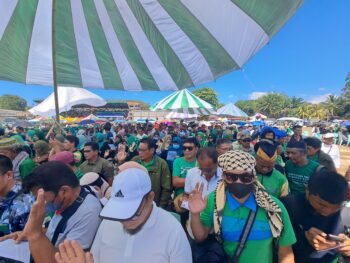DAVAO CITY (MindaNews/28 March) — The red tide alert covering Balete Bay in the northwestern side of Pujada Bay in Mati City, Davao Oriental has been lifted, an official of the Bureau of Fisheries and Aquatic Resources-11I said.
Speaking in Monday’s Kapehan sa Dabaw at SM City, BFAR 11’s chief of fish production Raul Millana said water sampling earlier this month showed that shellfish from the bay turned out negative of parasitic poisoning.
He said shellfish from the bay are now safe for consumption as the toxicity caused by an overgrowth in aquatic microorganisms called “dinoflagellates” had decreased to safe levels.
He surmised that the microorganisms which triggered the phenomenon known as algal bloom died due to drought.
“It is no longer conducive for the microorganisms. They were gone naturally,” he said.
BFAR-11 director Fatma Idris had said that siltation caused the overgrowth of microorganisms, and will continue to trigger the recurrence of red tide in Balete Bay if not addressed..
The result of the latest water sampling on Balete Bay came out last March 19, more than three weeks after the release of an earlier test that showed the bay was still affected by red tide.
BFAR-11 did the sampling weekly together with the local government of Mati City.
“We have sampling stations there. Previously, laboratory results showed high toxicity in Balete Bay,” Millana said.
Balete Bay was listed as safe, along with six other bays in Mindanao such as Dumaguillas Bay in Zamboanga del Sur, Tantanang Bay in Zamboanga Sibugay, Murdelagos in Zamboanga del Norte and Misamis Occidental, and Hinatuan, Bislig, and Lianga Bays in Surigao del Sur.
However, the BFAR advisory declared five provinces in the Visayas as positive of paralytic shellfish poison “that is beyond the regulatory limit.”
These are the coastal waters of Daram Island and Cambutatay in Western Samar; Leyte in Leyte; Naval, Biliran Island Province; and Pilar in Capiz.
“All types of shellfish and alamang gathered from these areas are not safe for human consumption. Fish, squids, shrimps, and crabs are safe for human consumption provided that they are fresh and washed thoroughly and internal organs such as gills and intestines are removed before cooking” it added.
Millana suggested limiting the number of fish cages in the major rivers in the region that end up at the Davao Gulf to protect it from further pollution and destruction.
On the effects of El Niño, he said they have yet to assess if the drought has already taken its toll on the fish catch in the region but no complaints have so far been reported to the BFAR-11. (Antonio L. Colina IV/MindaNews)
